Cauca, Colombia: «It is time to liberate our territories»
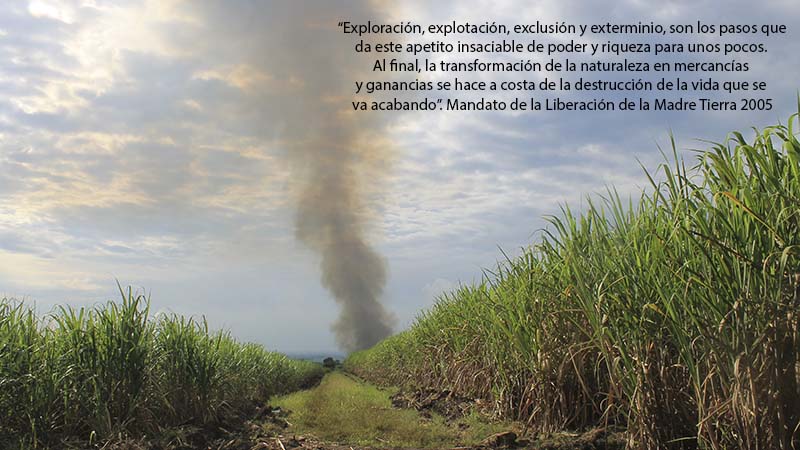
[Foto1]: «Exploration, exploitation, exclusion and extermination are the steps that this insatiable appetite for power and riches for a few. In the end, the transformation of nature into commodities and profits at the expense of the destruction of life that is being destroyed.» – Mandate of the Liberation of Mother Earth 2005.
The Nasa indigenous community of the Yu Lucx Life Plan (Resguardo of Canoas, Munchique and Nasa Kiwe Tek Cxaw) and of the Cxa Cxa Wala Life Plan (Resguardo of Corinto) come liberating Mother Earth since December 2014, according to the 2005 mandate, in the haciendas of Quebrada Seca, Miraflores, Granadita, and García, located in the low zone of this resguardo. They have organized themselves with more than 23 kitchens and dormitories built with guadua. They arrived to stay, asserting that “We will be here 20 or 30 years, but we will stay here until they negotiate.”
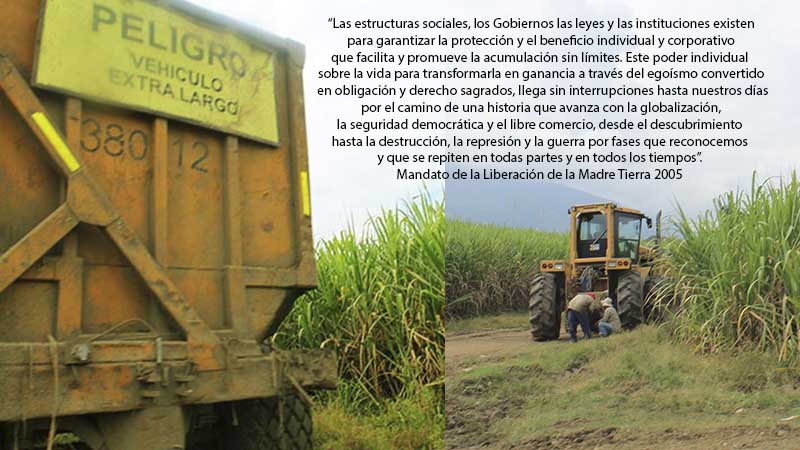
[Foto2]: The social structures, the governments, the laws and the institutions exist to guarantee the protection and the individual and corporate benefit that facilitates and promotes unlimited accumulation. This individual power to transform life into profit through selfishness converted into sacred right and obligation comes without interruption until our days on the path of a history that advances with globalization, the democratic security and free trade, from discovery to destruction, repression and war by phases that we recognize and that repeat everywhere and all the time.
-Mandate of the Liberation of Mother Earth 2005
In the 1970s, the indigenous communities of Cauca organized to recuperate their own lands that were in the hands of the wealthy landowners. “In that time the haciendas of Santa Helena, La Siberia, La Ester, and La Union were liberated. Those who paid terraje [sharecroppers’ rent] woke up. They worked three days and in that way they paid by terraje, the people organized and recuperated the haciendas, but continued with the recuperations in La Cominera, Las Guacas, Buenavista, and Los Pinos. In 1985 was when they negotiated. In that time Incora entered to negotiate with the landowners. There was an intention to sell. Later they continued with López Adentro, Pílamo, Guabio, and Vista Hermosa, but there it was difficult because the government repressed them, and there were five people killed. The people entered planting corn, beans, but the machines came and they razed the crops. Many were discouraged because they weren’t allowed to harvest, but other families continued and the recuperation was achieved.”

[Foto 3]: «We know that the rush to exploit life and to extract riches to accumulate unlimited and restless capital surge from the structures and the relations of our societies in which we live and were imposed on these lands and against our communities since the arrival of the conquerors.» – Mandate of the Liberation of Mother Earth, 2005.
Drug trafficking is a reality in Colombia that has scourged many communities. The forced displacement of indigenous, Afro and campesino communities has given a free pass to extractive policies. In light of the economic crisis, people have been obliged to plant illicit crops, but in small quantities to obtain some necessities. There are no clear land distribution policies. Agriculture is increasingly in crisis and the mining policies continue to be implemented in all of Latin America. A member of Corinto commented that “I have some coca plants because the other products have no market. Look! I go out with a bunch of plantains and I have to sell it cheap in the town because there’s nothing else I can do.”
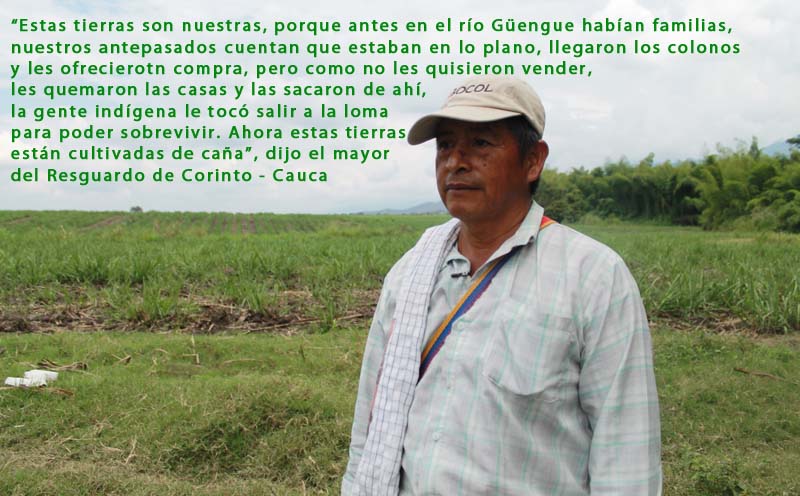
[Foto 4]: «These lands are ours, because before by the Guengue river there were families. Our ancestors tell us that they were on the plain. The colonists arrived and they offered to trade [for the land], but as they didn’t want to sell, they burned their houses and expelled them from there. The indigenous people had to go to the hills. Now these lands are cultivated for sugar cane,» said an elder of the Resguardo of Corinto.
The landscape of the Valle del Cauca has been destroyed. Many remember their childhood playing in the big trees, the abundant rivers, when there were many animals and birds. Now all of this has been ended by sugar cane, which are monocultures that have destroyed our food ways and caused a serious cultural impact. The agreements with the State, that have been signed by massacres is a historical debt, have not been met. There are zones of high risk but the communities refuse to leave because they don’t want to be displaced. “At least at home one has at least a yucca, but in the city, if you don’t have money, you can’t eat.”

[Foto 5]: «The big companies entered and they began to plant sugar cane, in other words all the production. They are exploiting Mother Earth. We as such good people that they they exploit and we buy [the sugar]. We are the ones that should be there but planting food,» expressed a member of the Resguardo of Corinto
The families that find themselves in the Liberation of Mother Earth in Corinto have organized in such a way that each person has a function. They take shifts so they don’t get tired. They help the work of the Indigenous Guard. They also have the kitchen coordinators, 23 sites where the children, elders, women, and youth eat. For meals they are working collectively in a minga. They have had the support of the authorities, and the community has also contributed goods such as yucca, plantain, fruits and meat. The families take shifts to be there. While some go home to work, others are on the farm. “It has been a long time since our elders began liberating Mother Earth, so that the time came for us to return to the recuperation of out lands, to once again liberate Mother Earth and recuperate was ours. We as sons and daughters to recuperate the land because before if our elders had stayed here they would have done away with them. They made them go toward the mountain. At least they continued to reproduce and here we are. Here there are still families that have not allowed themselves to be taken away. The sugar industry has wanted to buy them out but they have not sold out,” said a woman from Corinto.
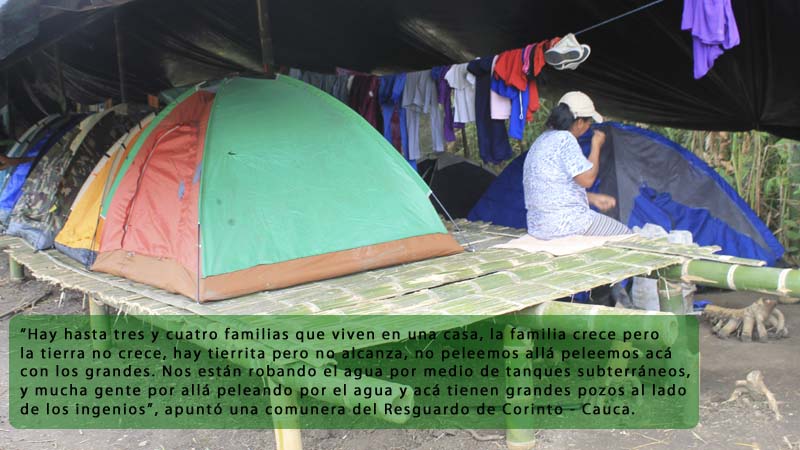
[Foto 6]: «There are three and four families that live in one house. The family grows but the land doesn’t. There is a little land but it’s not enough. We don’t fight there but we fight here with the big ones. They are stealing our water by subterranean tanks, and a lot of people are there fighting over water, and here there are huge ponds right next to the sugar cane plants,» noted a member of the Resguardo of Corinto.
Despite all the adversities they have had to face, the indigenous community of Corinto entered the haciendas in an organized way, without running down anyone. They have allowed the machines and the cañaduzal operators to work. “We are open to dialogue. We are here in a peaceful way, but we are also wary of tricks. We say we are going to continue until things happen. They want us to go in order to have a dialogue. Our position is that we don’t move from here, as they have to dialogue anyway. We want them to come here to dialogue, that they invite the supposed owners of these haciendas and they sit to dialogue con the communities. From here we don’t move until they give us these lands.”
“As Corinto we have always accompanied other recuperations but now we had to do one ourselves because we also need it.” There are 45 families in the veredas that are in high risk zones for landslide and there is need for land. “The people say that we are stealing but we are not stealing. We are liberating, recuperating what belonged to our ancestors.”
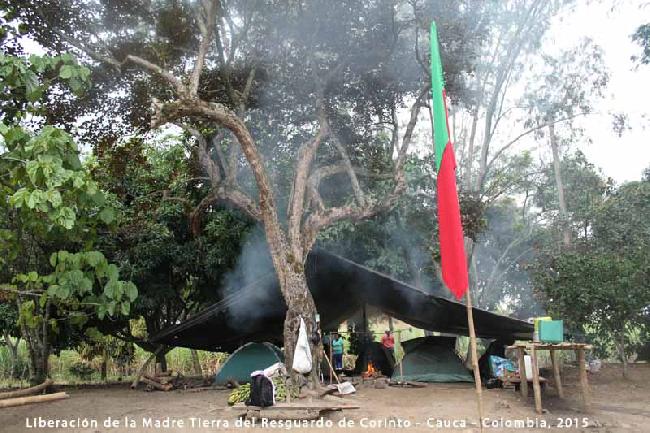
[Foto 7]: Liberation of Mother Earth in the Resguardo of Corinto, Cauca, Colombia. 2015.
The rivers that water these haciendas are the Paila and Guengue rivers. They are exploited for the monocultures and there is no retribution for the care of these rivers. The communities want to have other alternatives and one way is to plant food. Where there is water food can be cultivated. “We told the gentleman that we were going to be in one part, an area that was clean we were going to work and plant, but he did not like that, so he told us that he was going to send the army to defend these territories. The day that we planted the machine came and turned all of that over, though we had planted plantain, yucca, beans, and corn by the river banks.”
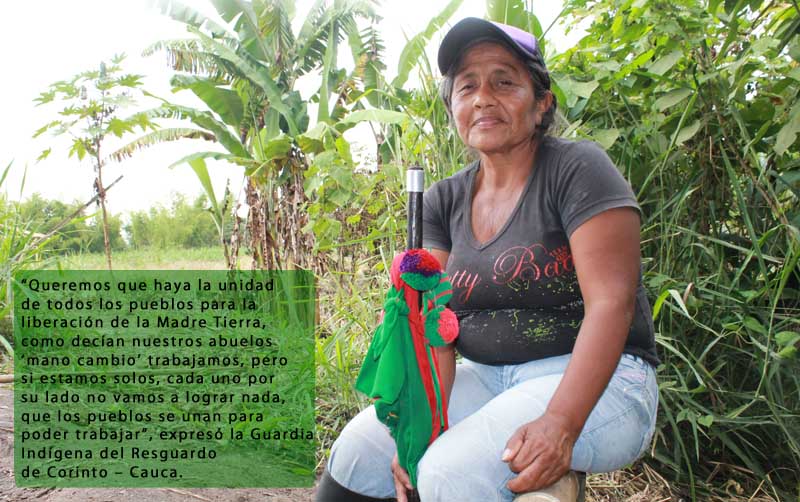
[Foto 8]: «We want there to be unity of all peoples for the liberation of Mother Earth. As our grandparents said ‘mano cambio’ [communal work], we work together, but if we are alone, each one on their own, we won’t achieve anything. The people must unite to be able to work,» expressed an Indigenous Guard from the Resguardo of Corinto
Whenever Mother Earth has been liberated, the indigenous guard was the first to arrive on the site. In Corinto they arrived since December 14, 2014 and the community began to arrive on December 16. “We go first to harmonize the site and so that the community can also enter. We hardly slept, and we had to cook for ourselves. When the community came it became better organized. We as elder women give example in this process to the Indigenous Guard. We encourage the youth so that they continue and they don’t join armed groups. I am almost 18 years old accompanying the cabildo. Here one relates with the youth, the elders, you get to know other places. We have been able to rescue young people from armed groups. A difficulty that we have had is the economic. At times we have to go out and we don’t have money even for the bus. We had to dig deep into our pockets, or at times we had to ask the drivers to take us without paying or that we would pay him later. As for food, well as poor people we ate what there was. Something I remember that was very difficult was when we went to accompany the Awá community. We walked for four days and it was hard but we went,” commented an elder woman from the Indigenous Guard of Corinto.
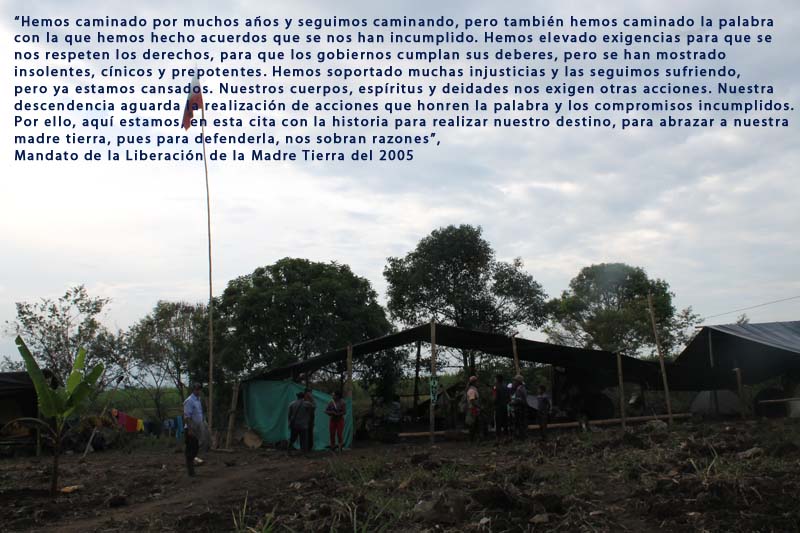
[Foto 9]: «We have walked for many years and we continue walking, but we also have walked the word with what we have done agreements that have not been realized. We have raised our demands so that our rights are respected, so that the governments fulfill their duties, but they have shown themselves to be insolent, cynical, and overpowering. We have dealt with many injustices and we continue suffering, but we are tired. Our bodies, spirits and deities demand other actions. Our descendants await the realization of actions that honor the word and the incomplete compromises. For that reason, we are here on this date with history to realize our destiny, to embrace our Mother Earth, to defend her, as we are abundant with rightness.»
We send greetings to all communities that have been liberating Mother Earth in the different places of the world, and we call on them to accompany us in this struggle against the policies of privatization exploitation, extermination, and against all that means death. Our ancestors have taught us that we can work hand in hand with other communities. Their great struggles have brought us here. We want to have a territory where we can all live, and that we don’t repeat that colonizing thought. We want the rivers to have the same abundance, that they flow freely to water our communal alternatives
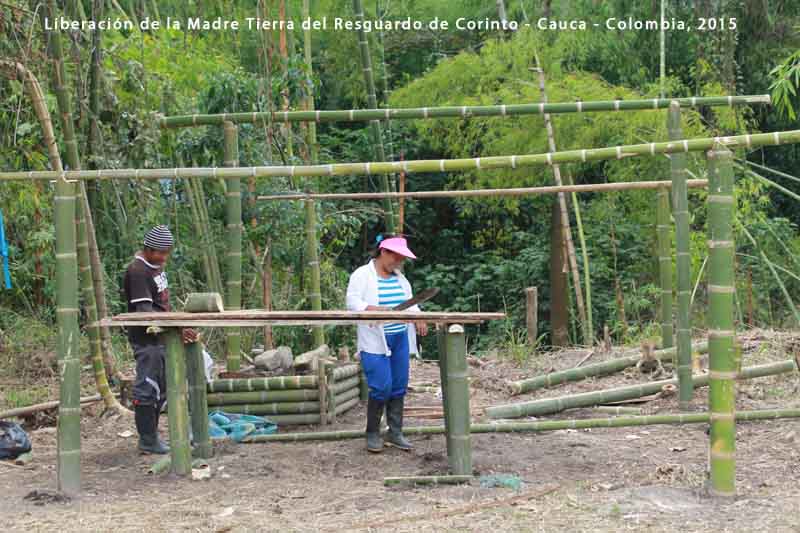

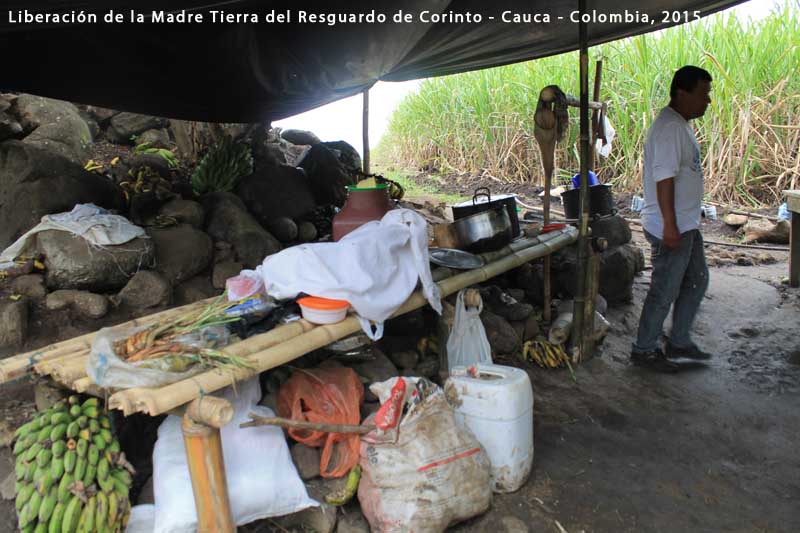
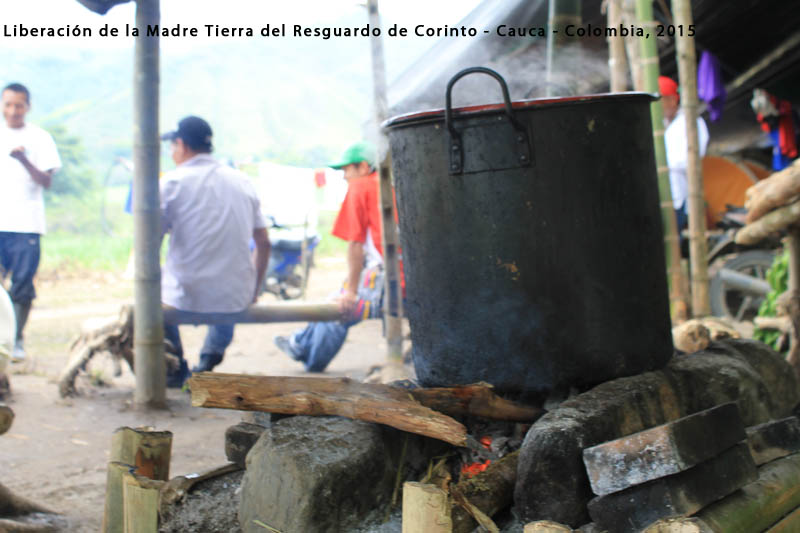
31 January 2015
Traducido al inglés por: Autumn Zellers León

